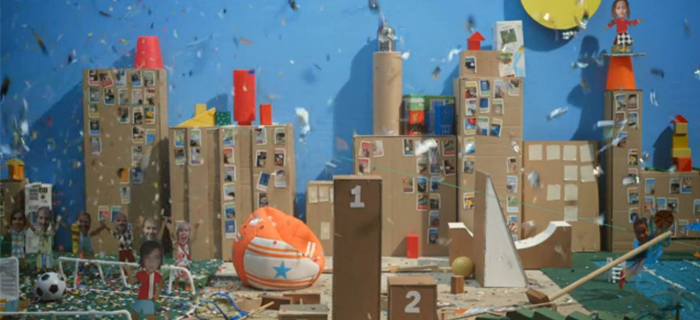Kinderen en jongeren zijn continu in het nieuws. De meest lezenswaardige/opvallende berichten uit andere bronnen verzamel ik wekelijks in een post met ‘kortjes’ – oneliners met een linkje naar het oorspronkelijke artikel. KLIK & LEES:
The smartphone self-portrait or ‘selfie’ has established itself a form of self-expression; is it a harmless fad or a dangerous sign of western society’s growing narcissism? (The Guardian)
Smartphone addiction has reached a new high according to recent findings which show how 20% of young adults have continued using their device during sex, this figure dropped to around one in ten for those over the age of 34 (Daily Mail)
Cosmetic firms are helping pre-teens ease into the world of makeup with tween cosmetics; products such as vibrant feline cosmetic collections and adorable animal-shaped moisturizers help make young girls comfortable with cosmetics through charming characters (Trend Hunter)
It looks like Rebecca Black finally decided which seat to take—a seat in a Honda; the Friday singer just popped up in a Vine video from the automaker—part of a campaign by RPA that sends personalized Vines to Honda fans on Twitter who use the hashtag #wantnewcar (AdFreak)
Queen bee Barbie, who has reigned over toyland for more than 50 years, may be losing the popularity contest to the new girls from Monster High; Mattel’s creepy-cool line of fashion toys, inspired by supernatural beings and launched a mere three years ago, is far outperforming sister brand Barbie (Chicago Tribune)
DisneyXD Netherlands is running a series of channel idents to promote the Dutch channel’s summer theme of ‘Chain Reactions’; film director Erwin van den IJssel decided to build story-based chain reactions crafted entirely out of objects kids could find at home (The Inspiration Room)
Season two of MTV docu-series Catfish was the number one cable telecast of the day among viewers ages 12-34; it might seem ironic that realness is so big a part of a show about people who are on TV for telling lies, but one reason it matters is that it is telling the truth about real lives of real people (Ypulse)
59% of teens said they Whitewall Facebook (meaning they regularly delete stuff they posted); teens aren’t fleeing Facebook, they’re shutting out the people (and brands) they don’t care about — not only are they blocking out the outsiders, they’re also faking it (The Mobile Youth Report)
For some kids, digital media can help by packaging powerful messages inside enticing apps; kids explore how we differ from one another, they interact with silly characters to learn emotional responses, or virtual friends share stories about how to best handle emotionally charged situations (USA Today)
Parents steer their kids to media as a distraction, to teach letters and numbers, and for pure entertainment; there are also times when parents rely on books, TV, museums and other media when they aren’t quite sure how to approach a difficult topic by themselves (NPR)
Headphone maker Sol Republic made an infographic that breaks down some of the recent trends in music discovery, including social listening and streaming services (Mashable)
Senioren leren jongeren weer slowen tijdens Gentse Feesten: “We moeten dringend weer aandacht geven aan paardansen, al is het maar om tieners de kans te geven om eens goed dicht bij elkaar te komen” (VRT Nieuws)
Onder de noemer ‘BiblioFreak’ voeren openbare bibliotheken in Duitstalige landen een gezamenlijke campagne om meer leden te werven; de openbare bibliotheek is bij uitstek geschikt voor ‘leesfreaks’, ‘muziekfreaks’, ‘poëziefreaks’, ‘knuffelfreaks’ en ‘vitaminefreaks’ (InformatieProfessional)
Op de ‘betere scholen’ ontwikkelt Engels zich tot tweede taal en dat is schadelijk voor de sociale cohesie van het land, meent Jaap Dronkers: “Sluipende tweetaligheid langs sociale scheidslijnen zal leiden tot een verdere politieke en culturele verwijdering tussen laag- en hooggeschoolde autochtonen” (de Volkskrant)
Rian Visser: “Over kinderen en nieuwe media wordt de grootste onzin geschreven, met als dieptepunt de Duitse onderzoeker Alfred Spitzer, auteur van het boek Digitale dementie, die het kindermishandeling vindt als jonge kinderen met een scherm te maken krijgen” (de Volkskrant)
Tussen juni 2012 en mei 2013 is het aantal geboorten opnieuw gedaald, tot 172 duizend, bijna net zo laag als in de eerste helft van de jaren tachtig; de afname lijkt samen te hangen met de economische crisis waarin Nederland al enkele jaren verkeert (CBS)
Honderden basisscholen moeten voor komend schooljaar leerkrachten ontslaan om het hoofd financieel boven water te houden; de scholen zelf vrezen voor de kwaliteit van hun onderwijs — de klassen worden komend jaar opnieuw groter (AD)
De economische malaise kan een zware wissel trekken op niet slechts de portemonnee van mensen, maar ook op hun gemoed en hun gezondheid, maar gelukkig is er een lichtpuntje: jongeren interesseren zich meer voor het milieu en sociale problemen, zo ontdekten onderzoekers uit Californië (Fok!)
De jeugd van tegenwoordig gebruikt steeds meer harddrugs; dat zou door de crisis komen, harddrugs is namelijk stukken goedkoper dan softdrugs — maar hoe gevaarlijk zijn speed en lachgas? (Editie NL)
De aanpak van kinderen met overgewicht in Amsterdam slaat door; door het alarm over obesitas krijgen kinderen nu veel te snel het stempel ’te zwaar’, wat negatieve gevolgen heeft voor hun zelfbeeld, stellen diëtisten en obesitasdeskundigen (Parool.nl)
Er is een nieuw middel om overgewicht onder jongeren tegen te gaan, want een aantal scholen gaat experimenteren met ‘Scoolcompany’; ouders kunnen van achter de computer bepalen wat hun kinderen in de schoolkantine kopen — het is als ‘Big Brother’ in de schoolkantine (AD)
Een Noors bedrijf heeft de Filip ontwikkeld, een horloge waarmee je kunt bellen en berichtjes kunt sturen en dat beschikt over wifi en gps; alleen moet de liefhebber voor dit horloge wel over hele dunne polsen beschikken, het horloge is namelijk bedoeld om kinderen in de gaten te houden (Trouw)

